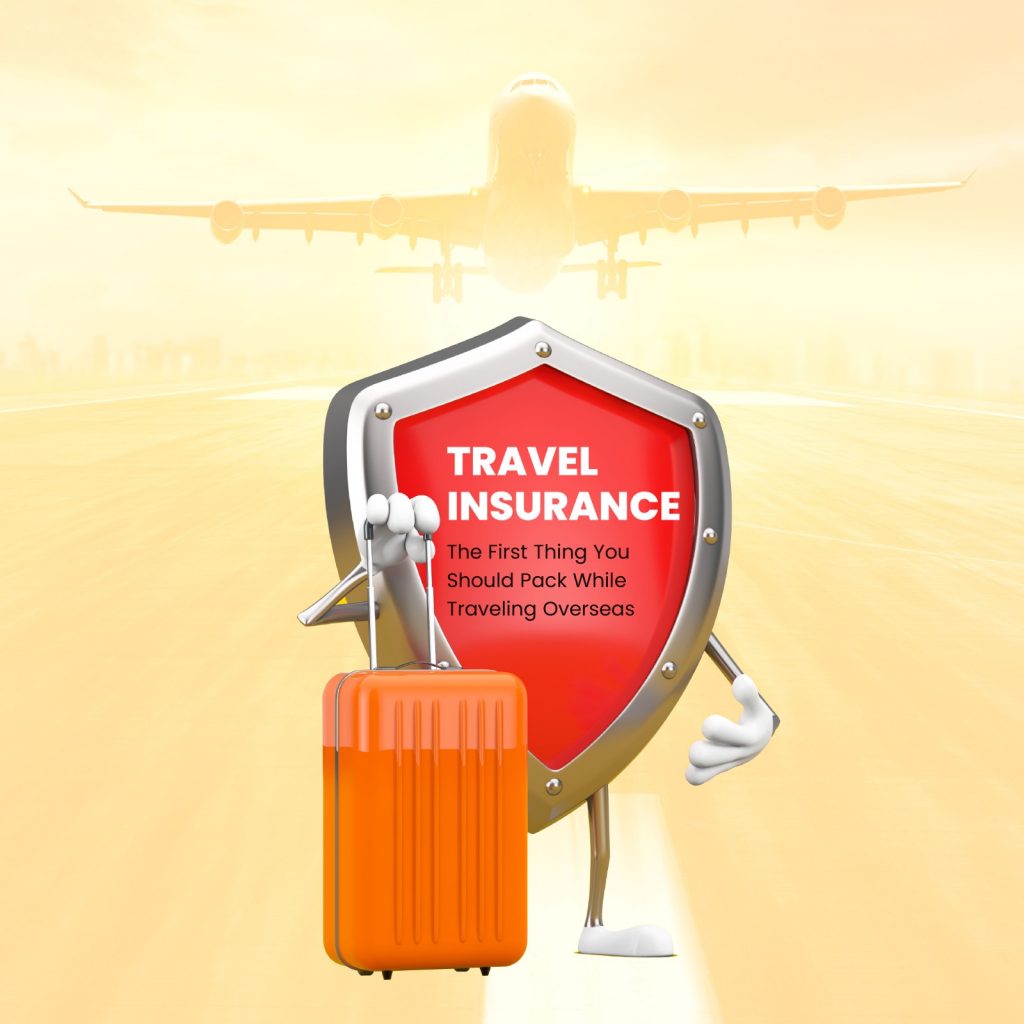Travel insurance is a vital safeguard for travelers, offering peace of mind and financial protection against unforeseen events. It acts as a safety net, ensuring you can navigate unexpected challenges with confidence and minimize potential losses.
From medical emergencies and flight disruptions to lost luggage and trip cancellations, travel insurance provides coverage for a wide range of situations that could derail your journey. By understanding the various types of coverage available and choosing a plan that aligns with your individual needs, you can embark on your adventures with greater assurance.
What is Travel Insurance?
Travel insurance is a type of insurance that protects you against financial losses that can occur while you are traveling. It provides coverage for various unforeseen events, such as medical emergencies, trip cancellations, lost or stolen luggage, and more.
Types of Travel Insurance Coverage
Travel insurance policies can offer a range of coverage options, depending on your needs and the specific policy you choose. Here are some common types of coverage:
- Medical Expenses: Covers medical costs incurred due to illness or injury while traveling, including hospitalization, doctor’s fees, and emergency medical evacuation.
- Trip Cancellation: Reimburses you for non-refundable travel expenses if you have to cancel your trip due to covered reasons, such as illness, injury, or death of a family member.
- Trip Interruption: Provides coverage if you have to cut your trip short due to a covered event, such as a medical emergency or natural disaster.
- Baggage Loss or Damage: Covers the cost of replacing or repairing lost or damaged luggage, including personal belongings.
- Personal Liability: Protects you against legal claims if you accidentally injure someone or damage property while traveling.
- Emergency Assistance: Provides access to 24/7 assistance services, including medical referrals, legal advice, and emergency transportation.
Examples of Travel Insurance Policies
There are many different travel insurance policies available, each with its own features and benefits. Here are a few examples:
- Basic Travel Insurance: Typically covers essential benefits like medical expenses, trip cancellation, and baggage loss, with limited coverage for other events.
- Comprehensive Travel Insurance: Offers more extensive coverage, including trip interruption, personal liability, and emergency assistance services.
- Adventure Travel Insurance: Designed for travelers participating in adventurous activities, such as skiing, scuba diving, or hiking, with additional coverage for risks associated with these activities.
- Senior Travel Insurance: Tailored to the specific needs of older travelers, with higher coverage limits for medical expenses and other relevant benefits.
Key Considerations for Choosing Travel Insurance

Choosing the right travel insurance is crucial for protecting yourself financially in case of unexpected events during your trip. With numerous providers and plans available, it’s important to carefully consider your specific needs and preferences before making a decision.
Factors to Consider When Selecting Travel Insurance
The right travel insurance plan depends on several factors, including your destination, trip duration, age, and health conditions.
- Destination: Different destinations have varying risks, so choose a plan that offers adequate coverage for the specific location you’re traveling to. For example, a plan that covers medical emergencies in a remote area may be necessary for a trip to the Amazon rainforest.
- Trip Duration: Longer trips typically require more comprehensive coverage, as there is a higher chance of unforeseen events occurring. Choose a plan that covers the entire duration of your trip.
- Age: Some insurers offer discounts for younger travelers, while others may charge higher premiums for older individuals. It’s important to compare plans based on your age and health conditions.
- Health Conditions: If you have any pre-existing medical conditions, make sure your travel insurance plan covers them. Some plans may exclude coverage for certain conditions, so it’s essential to disclose any relevant information to the insurer.
Comparing Travel Insurance Providers and Their Coverage Options
Different providers offer various coverage options and premiums. Comparing plans is essential to find the best value for your needs.
- Coverage Options: Some common coverage options include medical expenses, trip cancellation or interruption, lost or stolen baggage, and emergency evacuation. Consider your specific needs and prioritize the coverage that is most important to you.
- Premiums: Compare the premiums charged by different providers for similar coverage levels. Keep in mind that lower premiums may mean less comprehensive coverage, so weigh the costs and benefits carefully.
- Customer Service: Look for providers with a good reputation for customer service and claims handling. Check online reviews and ratings to get an idea of their responsiveness and efficiency.
Reading the Policy Terms and Conditions Carefully
Before purchasing a travel insurance policy, it’s crucial to read the terms and conditions carefully. This will help you understand the coverage limits, exclusions, and any specific requirements.
- Coverage Limits: Check the maximum amount the insurer will pay for each type of claim. For example, there may be a limit on the amount covered for medical expenses or lost baggage.
- Exclusions: Understand what events or situations are not covered by the policy. Common exclusions include pre-existing medical conditions, acts of war, and natural disasters.
- Requirements: Be aware of any specific requirements for filing a claim, such as providing proof of loss or medical records.
Filing a Travel Insurance Claim

Filing a travel insurance claim can be a straightforward process if you understand the requirements and follow the necessary steps. The process typically involves notifying your insurance provider, gathering supporting documentation, and submitting your claim for review.
Claim Filing Process
The process of filing a travel insurance claim typically involves these steps:
- Contact your insurance provider: The first step is to contact your insurance provider as soon as possible after the event that triggered your claim. This is usually done by phone or through their online portal. You will need to provide them with basic information, such as your policy number, the date of the event, and a brief description of what happened.
- Gather supporting documentation: To support your claim, you will need to gather relevant documentation. This may include:
- Copies of your travel documents (passport, tickets, itinerary)
- Medical bills or receipts for medical expenses
- Police reports for theft or accidents
- Photos or videos of the event
- Letters from your doctor or hospital
- Any other relevant documentation that proves your claim
- Submit your claim: Once you have gathered all the necessary documentation, you can submit your claim to your insurance provider. You can usually do this online, by mail, or by fax.
- Review and processing: The insurance provider will review your claim and the supporting documentation. They will contact you to request any additional information they may need. The processing time for claims can vary depending on the complexity of the claim and the insurance provider.
Tips for Effective Documentation
Effective documentation is crucial for a successful travel insurance claim. Here are some tips for documenting your claim effectively:
- Keep detailed records: Maintain a detailed record of your travel plans, expenses, and any events that might trigger a claim. This includes receipts, boarding passes, itineraries, and any communication with your insurance provider.
- Take photos and videos: Capture photos and videos of any damage, injuries, or incidents that might support your claim. This visual evidence can be invaluable in demonstrating the extent of your loss.
- Get witness statements: If possible, obtain statements from witnesses who can corroborate your account of the event. This can be particularly helpful in cases of theft or accidents.
- Submit your claim promptly: Delaying your claim can make it harder to prove your case. Submit your claim as soon as possible after the event to ensure that all the details are fresh in your mind.
- Be honest and accurate: Providing false or misleading information can jeopardize your claim. Be truthful and accurate in your documentation and communication with your insurance provider.
Common Reasons for Claim Denials
While travel insurance is designed to protect you from unexpected events, there are certain situations where your claim might be denied. Some common reasons for claim denials include:
- Pre-existing conditions: Travel insurance typically doesn’t cover pre-existing medical conditions unless they are specifically disclosed and included in your policy.
- Failure to follow policy guidelines: Not adhering to the terms and conditions of your policy, such as failing to notify your insurance provider promptly or neglecting to seek medical attention, can lead to claim denial.
- Acts of war or terrorism: Most travel insurance policies exclude coverage for events related to war or terrorism.
- Engaging in risky activities: Engaging in activities that are considered high-risk, such as extreme sports or dangerous activities, may not be covered by your insurance policy.
- Fraudulent claims: Submitting false or exaggerated information to inflate your claim can result in denial and potential legal consequences.
How to Avoid Claim Denials
To avoid claim denials, it’s essential to understand the terms and conditions of your travel insurance policy and follow these guidelines:
- Read your policy carefully: Before purchasing a policy, thoroughly read the terms and conditions to understand what is covered and what is excluded.
- Disclose pre-existing conditions: If you have any pre-existing medical conditions, disclose them to your insurance provider before purchasing a policy.
- Follow policy guidelines: Adhere to the guidelines Artikeld in your policy, such as notifying your insurance provider promptly and seeking medical attention as recommended.
- Avoid risky activities: If you plan to engage in risky activities, consider purchasing additional coverage or ensuring that your policy covers those activities.
- Be honest and transparent: Provide accurate and complete information to your insurance provider to ensure a smooth and successful claim process.
Travel Insurance Myths and Misconceptions
Travel insurance is often misunderstood, leading to some common misconceptions. While it’s a valuable tool for protecting yourself against unexpected travel disruptions, it’s important to understand what it does and doesn’t cover. Let’s debunk some of these myths and clarify the realities of travel insurance.
Travel Insurance is Only for International Travel
Many people believe that travel insurance is only necessary for trips outside their home country. However, this is not the case. Travel insurance can be just as important for domestic trips, especially if you’re traveling to a different region or state. Domestic travel insurance can provide coverage for:
- Trip cancellation or interruption due to unexpected events such as severe weather, natural disasters, or illness.
- Medical emergencies, including hospitalization and evacuation.
- Lost or stolen baggage.
- Rental car damage or theft.
It’s important to remember that even within your own country, unexpected events can occur, and having travel insurance can provide financial protection and peace of mind.
My Health Insurance Covers Me While Traveling
While your health insurance may provide some coverage outside your home country, it’s often limited and may not cover all medical expenses. Many health insurance plans have exclusions or limitations for travel-related medical expenses, such as:
- Pre-existing conditions.
- Emergency evacuation or repatriation.
- Coverage for certain types of medical treatments.
Additionally, your health insurance may not cover non-medical expenses associated with a travel disruption, such as flight cancellations, lost baggage, or trip interruptions.
Travel Insurance is Too Expensive
The cost of travel insurance can vary depending on factors such as your destination, the length of your trip, and the level of coverage you choose. However, the cost of travel insurance is often far less than the potential costs of unexpected events.
- Consider the cost of a canceled flight, missed cruise, or medical emergency abroad. These expenses can easily exceed the cost of travel insurance.
- Many travel insurance policies offer flexible payment options, including monthly installments.
- The peace of mind that comes with knowing you’re protected can be invaluable.
I Don’t Need Travel Insurance If I’m Traveling With a Group
Traveling with a group doesn’t eliminate the risks associated with travel. Even if your group is organized and well-planned, unexpected events can happen, and individuals can still be affected.
- Travel insurance provides individual coverage, regardless of whether you’re traveling with a group or alone.
- It’s important to ensure that all members of your group have their own travel insurance policies.
Travel insurance protects each individual traveler, ensuring that everyone has the necessary coverage in case of an emergency.
Travel Insurance Only Covers Medical Emergencies
Travel insurance can cover much more than just medical emergencies. It can also provide coverage for a wide range of travel disruptions, such as:
- Trip cancellation or interruption due to illness, injury, or death.
- Lost or stolen baggage.
- Flight delays or cancellations.
- Rental car damage or theft.
- Emergency evacuation or repatriation.
The specific coverage provided will vary depending on the policy you choose, but many policies offer comprehensive protection against a variety of travel-related risks.
I Can Use My Credit Card for Travel Insurance
Many credit cards offer travel insurance as a benefit, but it’s important to understand the limitations. Credit card travel insurance is often limited in scope and may not cover all travel-related risks.
- Credit card insurance may have lower coverage limits or specific exclusions.
- It may not cover all travel disruptions, such as trip cancellation or interruption due to illness or injury.
- It’s essential to review the terms and conditions of your credit card’s travel insurance to understand its limitations.
I’m Young and Healthy, I Don’t Need Travel Insurance
Age and health are not the only factors to consider when deciding whether to purchase travel insurance. Unexpected events can happen to anyone, regardless of age or health status.
- Travel insurance provides financial protection against unexpected events, regardless of your age or health.
- It’s always better to be safe than sorry, especially when traveling to a new destination.
I Can Self-Insure by Setting Aside Money
While it’s good practice to have an emergency fund, self-insuring for travel risks is not recommended. Unexpected events can be costly, and setting aside money may not be enough to cover all potential expenses.
- Travel insurance provides comprehensive coverage for a wide range of travel-related risks.
- It offers financial protection and peace of mind, allowing you to enjoy your trip without worrying about unexpected costs.
I Can Get Travel Insurance at the Airport
While you can purchase travel insurance at the airport, it’s often more expensive and may not offer the same level of coverage as policies purchased in advance.
- Airport travel insurance policies are typically last-minute options and may have limited coverage.
- It’s advisable to purchase travel insurance in advance to ensure you have adequate coverage and to compare different options.
End of Discussion

In conclusion, travel insurance is an invaluable investment for any traveler, offering a comprehensive shield against potential risks and financial burdens. By carefully considering your destination, trip duration, and individual needs, you can choose a policy that provides the right level of coverage and ensures a worry-free travel experience.
Travel insurance can be a lifesaver in case of unexpected events, but it’s also important to plan ahead and make sure you’re getting the right coverage for your needs. You might want to check out cornell university it program review reddit for insights into the program’s curriculum, which might help you understand how technology plays a role in travel planning and safety.